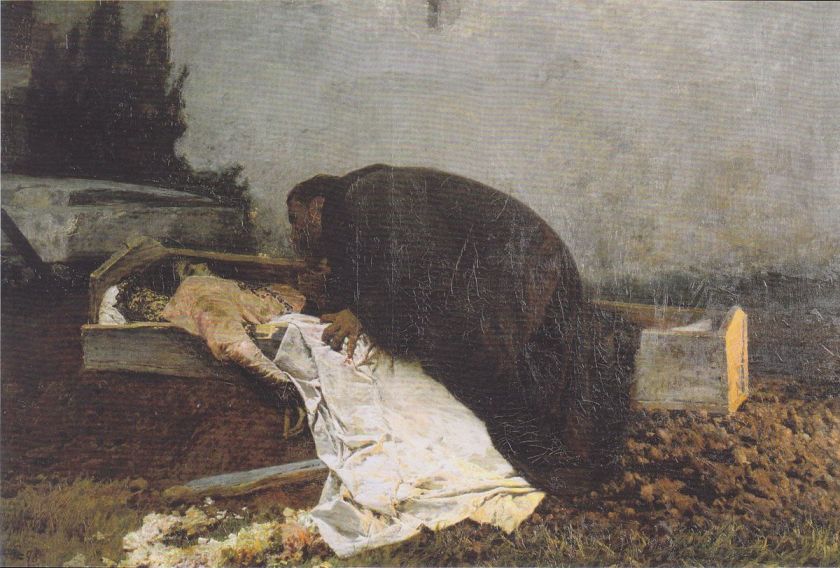
Καὶ ἔτι πλείονας λόγους ποιουμένου τοῦ Ἰωάννου πρὸς τοὺς ἀδελφούς, ὡς τῶν προσκαίρων ἕνεκεν τούτους καταφρονεῖν, ὁ τῆς Δρουσιανῆς ἐρῶν ἐξαφθεὶς δεινοτάτῃ ἐπιθυμίᾳ καὶ ἐνεργείᾳ τοῦ πολυμόρφου Σατανᾶ τὸν τοῦ Ἀνδρονίκου ἐπίτροπον ὄντα φιλάργυρον ὠνεῖται χρήμασιν ἱκανοῖς· ὅστις ἀνοίξας τὸν τάφον Δρουσιανῆς ἐπέτρεψε διαπράξασθαι τὸ ἀπηγορευμένον εἰς νεκρὸν σῶμα. μὴ ἐπιτυγχάνων αὐτῆς ζώσης μετὰ θάνατον τῷ σώματι προσλιπαρῶν ἀπεκρίνατο· “εἰ καὶ ζῶσα οὐκ ἠκολούθεις μοι κοινωνῆσαι, μετὰ θάνατον νεκράν σε οὖσαν ἐνυβρίσω.” τοῦτο οὖν ἐνθυμούμενος, καὶ κατασκευάσας ἑαυτῷ τὴν διὰ τοῦ μιαροῦ ἐπιτρόπου ἀσέβειαν, εἰσεπήδησεν εἰς τὸ μνῆμα σὺν ἐκείνῳ ἅμα· καὶ ἀνοίξαντες τὴν θύραν ἤρξαντο ἀποδύειν τοῦ πτώματος τὰ ἐντάφια λέγοντες· “τί ὠφέλησας ταλαίπωρε Δρουσιανή; τοῦτο ζῶσα πεποιηκέναι οὐκ ἠδύνασο, ὃ τάχα ἂν οὐδέν σε ἐλύπησεν ἑκοῦσαν τοῦτο ποιησαμένην; καὶ ταῦτα τούτων λεγόντων, καὶ μόνον ὃ σύνηθες καρκάλιον περὶ τὴν σάρκα ταύτης ἐναπομεῖναν, ξένον ὁρᾶται θέαμα ὃ παθεῖν ἄξιον τοὺς ταῦτα δρῶντας· ὄφις ποθὲν ἐπιφανεὶς τὸν μὲν ἐπίτροπον μονόπληγα τίθησιν· ὃν καὶ ἀνεῖλεν· ἐκεῖνον δὲ τὸν νεανίσκον οὐ τύπτει, ἀλλὰ τοῖς ποσὶν αὐτοῦ περιειλεῖτο δεινῶς ἀποφυσῶν, καὶ πεσόντος αὐτοῦ ἐπαναβὰς ὁ ὄφις ἐπάνω αὐτοῦ ἐκαθέζετο.
(Acta Joannis 70-71)
While John continued to preach to the brethren that they despise earthly goods for the sake of the eternal ones, the lover of Drusiana, inflamed by the influence of the polymorphous Satan to the most ardent passions, bribed the greedy steward of Andronicus with money. And he opened the tomb of Drusiana and left him to accomplish on the body that which was once denied to him. Since he had not procured her during her lifetime, he continually thought of her body after she was dead, and exclaimed, ‘Although when living you refused to unite with me in love, after your death I will dishonour your corpse.’ Being in such a frame of mind he obtained the opportunity to execute his impious plan through the accursed steward, and both went to the tomb. Having opened the door, they began to take the graveclothes from the corpse, and said, ‘What have you gained, unhappy Drusiana? Could you not have done this while you were alive? It need not have grieved you if you had done it willingly.’ Whilst they spoke and only the shift remained, there appeared something wonderful, which people that do such things deserve to experience. A serpent appeared from somewhere, bit the steward, and killed him. And the serpent did not bite the young man, but encircled his feet, hissing fearfully, and when he fell down, the serpent sat on him. (tr. James Keith Elliott)
